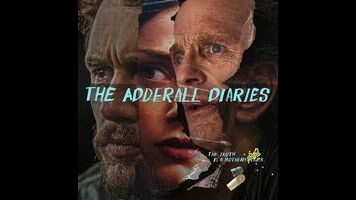The Adderall Diaries wastes interesting questions on a James Franco character

If, as The Adderall Diaries posits, the truth is subjective, that puts a reviewer in an awkward bind. On a purely technical level, the film is fine, if overly reliant on indie-movie clichés. It features some good performances from proven actors, and touches on some interesting philosophical questions. Subjectively, those performances are wasted on characters who are either woefully underutilized or aggressively unlikable (specifically, one that is aggressively unlikable, and the rest underutilized). And if an interesting philosophical question is posed by a total douchebag, who even cares?
James Franco stars as Stephen Elliott, real-life author of the memoir on which writer-director Pamela Romanowsky based the screenplay for this film. Stephen lives in a privileged Brooklyn bubble, the kind of place where coffee is hand-ground in spare, stylish industrial-chic lofts and The New York Times is just referred to as “the Times.” But that’s not what makes him so toxic. The onscreen Stephen (we’ll give the real person, who was not pleased with his onscreen avatar, the benefit of the doubt) is also a shallow, self-pitying, chronically avoidant man-child, whose response to any sort of friction in his cushy life is to go bury his face in a strange pair of tits in between hits on whatever pipe is handed to him. We’re supposed to interpret this self-destructive streak as evidence of great talent, as hoary of a cliché about art and artists as there is.
Stephen’s excuse for all this is that he had a traumatic childhood, marked by physical and emotional abuse from his father—who he claims died years ago—and struggles with homelessness and addiction. He’s made a career writing about that trauma, which seems to be going quite well for him until his actual, very much alive father, Neil Elliott (Ed Harris), shows up at a reading to dispute Stephen’s version of the facts. Meanwhile, Stephen is busy ignoring the book he’s been contracted to write in order to attend the trial of Hans Reiser (Christian Slater), a wealthy computer programmer accused of murdering his wife. Drawing vague parallels between Reiser and his own (purported) story, Stephen is convinced he’s going to write his masterpiece about the trial, pompously comparing himself to Truman Capote and Norman Mailer to his saintly editor Jen (Cynthia Nixon).
At the trial, Stephen meets and strikes up a BDSM-tinged romance with Lana (Amber Heard), a New York Times reporter with an unkempt brunette mane and little symmetrical cutting scars on her thighs. We never really see Stephen writing much, making his tortured genius act all the more irritating; Lana, on the other hand, never seems to work at all, save to do Stephen a favor by getting his rebuttal to his father’s accusations into the op-ed section. She’s the edgy, damaged cousin of the manic pixie dream girl, whose role is not to convince the depressed hero that life is worth living but to validate all of his worst tendencies. Together Lana and Stephen hit the bars, have kinky sex, and pop a pharmacy’s worth of pills; they’re the hipster version of Fifty Shades Of Grey, complete with the lukewarm chemistry.
Unlike Stephen’s increasingly unreliable narrator, Lana seems to have suffered some real abuse at the hands of her stepfather, but we never really find out what that is as she settles into her eventual role as the one who got away. Not that it really matters, though, because the only personal narrative that counts here is Stephen’s. To that end, the scenes between Franco and Harris exploring the complexities of their characters’ shared past are interesting and well acted, if on the showy side; they could have had something to say, were they in a less shallow movie.
Aside from Stephen’s personal crisis as his life begins to crumble around him, everything that happens in The Adderall Diaries is treated with the same weight, which is to say no weight at all. Despite what the title would lead you to believe, Stephen’s pharmaceutical addiction is barely commented upon, and the sensational murder trial that ostensibly drives the plot feels similarly incidental. Instead, the filmmaking is laden with forced quirkiness, from the commercial-ready soundtrack to the handwritten title card to the neon-lit sex scenes. All this is secondary, though, to the heavy-handed use of heavily filtered and deliberately jagged flashbacks, doling out harrowing and sometimes contradictory bits and pieces of Stephen’s past. The fractiousness and myopia might be a deliberate strategy, a superficial way of telling a story about a superficial guy. But, unlike Stephen’s friends and family, we’re not obligated to indulge him.